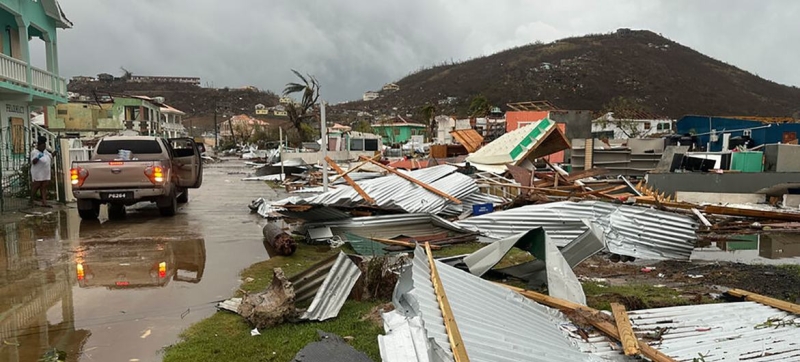
The consequences of hurricane “Beryl”. In the photo: Saint Vincent and the Grenadines. The head of the UN Climate Change Secretariat speaks about the devastating consequences of Hurricane Beryl Climate and Environment
Visiting his home island of Carriacou after Hurricane Beryl, the Executive Secretary of the UN Framework Convention on Climate Change, Simon Steele, was shocked by what he saw and recorded a video message to the international community.
“My grandmother’s house is completely destroyed”
“I’m now in the living room of my neighbors’ house. My grandmother’s house, located on the next street, is completely destroyed,” says Steele.
According to preliminary data, 98 percent of houses and buildings on Carriacou were either destroyed or significantly damaged by the recent unprecedented Hurricane Beryl.
Carriacou is an island in the Grenadines archipelago islands), located in the southeastern part of the Caribbean Sea, northeast of Grenada.
Hurricane Beryl, which struck the Caribbean in early July, became the first in a series of severe Atlantic storms in 2024. This was stated by experts from the World Meteorological Organization (WMO). life and safety of their family and friends
“From our home on the island of Carriacou, my fellow countrymen and I have witnessed devastation that is painfully familiar to hundreds of millions of people around the world,” says the head of the UNFCCC. “I am inspired by the resilience of people here and around the world. Climate disaster survivors tell me that material possessions are not as important as the lives and safety of their family and friends.”
All countries and regions are at risk
This, he said, concerns everyone – from the largest and most developed countries to the smallest and most vulnerable. We’re talking about the island of Carriacou, the United States, India, Kenya and every other country on Earth.
Simon Steele is worried about what will happen to families in the coming months and years who still live in temporary accommodation and still owe the bank for the house, now destroyed. But most likely, given the scale of climate change, countries are facing new hurricanes, floods or forest fires.
Endless cycles of debt
“We are also talking about endless cycles of debt – countries take out loans to rebuild after destruction, and then face another climate disaster and forced to take out loans again to reconstruct destroyed infrastructure, redirect limited resources from education, health and development,” adds Steele.
Tragic as it is, he said such impacts on lives and livelihoods due to Beryl are not unique. This growing cost of uncontrolled climate catastrophe is felt in every country on Earth. sudden and destructive, fires and droughts so devastating and costly, both in the short and long term historical perspective.
The consequences of climate change
Simon Steele recalls that in the last month alone, heat waves in India have led to the death of thousands of people. Also this year, more than a thousand pilgrims died during the Hajj in Mecca.
Two years ago, a third of Pakistan was under water, more than a thousand people died, millions were forced to flee their homes , and 3.5 million children were unable to attend school.
In the Caribbean and the United States, Beryl dealt a double whammy, amplified by climate conditions, proving to be a devastating force that left millions without power in Texas alone, accompanied by dangerous heat. “These colossal climate costs have risen to the level of a serious threat to national security in every country,” emphasizes the Executive Secretary.
Significant long-term costs
According to him, climate disasters do not just cripple people’s lives, they entail significant long-term costs. One recent report estimates the cost of inaction at $38 trillion a year until 2050, Steele notes. The same report found that climate action would cost less than a sixth of that amount.
Intensify efforts
“Rather than counting the cost of climate disaster, all countries should step up efforts to prevent it. This means that all governments must put climate action at the top of their agenda,” he urged.
Above all, he said, reduce fossil fuel pollution by half this decade, as science demands.
Better plans are also needed adaptation measures that will strengthen climate resilience and protect communities, economies, supply chains and the profits of companies currently affected by global warming.
Climate Action This is an investment, not an expense. They provide a return on investment in new, clean infrastructure and stimulate economic growth, Steele said.
“We can prevent disaster”
“What the climate crisis did to my grandmother’s house should not become the new normal for humanity. We can still prevent this, but only if people around the world speak out and demand bolder climate action now, before it’s too late,” Simon Steele concluded his video message.   ;
